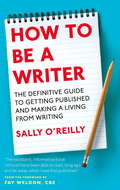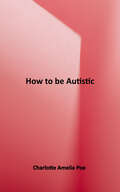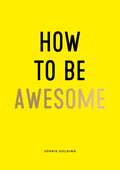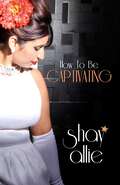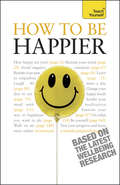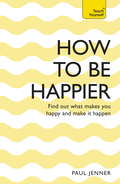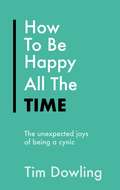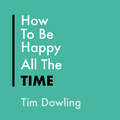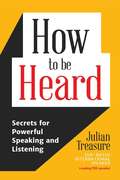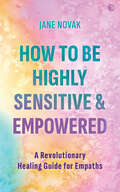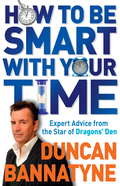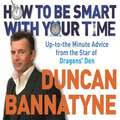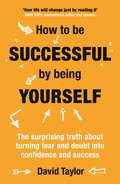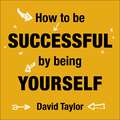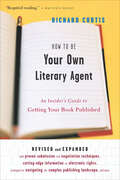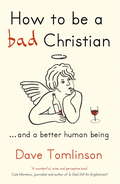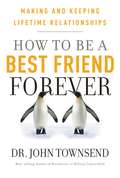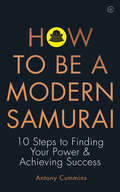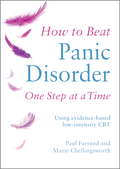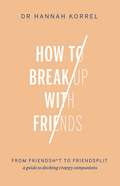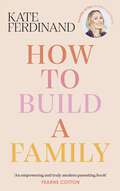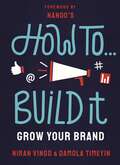- Table View
- List View
How To Be A Writer: The definitive guide to getting published and making a living from writing
by Sally O'ReillyHow To Be a Writer is a comprehensive guide to the career of writing from experienced writer and creative writing tutor Sally O'Reilly.The book will cover questions such as: If you want to be a writer, should you invest in a creative writing course? If so, which one? Are writing groups a good thing? What grants, awards and prizes are available to the aspiring writer? How should you plan your career in the long term? It will also feature an introduction from Fay Weldon - 'Why I wish I'd read this book when I was 25' - and will include comments and case studies from other established authors, agents and industry experts. How To Be a Writer will include everything that a writer needs to know about running their own career, from choosing an agent to café scribbling, and from filing a tax return to flirting with the literati and will be an essential reference book for any author who takes their work seriously.
How To Be Autistic
by Charlotte Amelia PoeThis book charts the author’s journey through schooldays and young adulthood, with chapters on food, fandom, depression, body piercing, comic conventions, and technology. The author writes about her memoir: ‘The best way to describe it is to imagine a road trip. If a neurotypical person wants to get from A to B, then they will most often find their way unobstructed, without road works or diversions. For an autistic person, they will find that they are having to use back roads and cut across fields and explore places neurotypicals would never even imagine visiting. The book challenges narratives of autism as something to be ‘fixed’, as the author believes her autism is a fundamental aspect of her work. She writes: ‘I wanted to show the side of autism that I have lived through, the side you don’t find in books and on Facebook groups. My piece is a story about survival, fear, and, finally, hope. It is an open letter to every autistic person who has suffered verbal, mental, or physical abuse and come out snarling and alive. ‘If I can change just one person’s perceptions, if I can help one person with autism feel like they’re less alone, then this will all be worth it. So please, turn the page. Our worlds are about to collide.’
How To Be Awesome: Wise Words and Smart Ideas to Help You Win at Life
by Sophie GoldingUnleash your inner awesomeness!Whether you’re stuck in a rut and need some fresh inspiration, or you’re looking for guidance on finding happiness, courage or motivation, this book is packed with tips to help you grab life with both hands and make it the best it can be. You’re one-of-a-kind amazing, so let your light shine!
How To Be Captivating
by Shay AllieHow do you become successful? What makes all heads turn when you enter the room? What attracts the best clients and even the opposite sex? Being Captivating. Being Captivating makes you an instant magnet to other people, in all areas of life. By learning how to be captivating on all levels, from the inside out, you can make an impact wherever you go, immediately. Through her Captivating Presence business, Shay Allie has worked with speakers, singers and stage performers on HOW to make an impact and exude their most captivating self. In this book, Shay's friendly and easy-going style ensure that you can apply her captivating techniques to make an impact and shine like the star that you were born to be. Being Captivating is an insider's guide to what that "it" factor actually is and how you can create it, own it and become truly captivating.
How To Be Happier
by Paul JennerHow happy are you? How To Be Happier encourages you to answer this question - honestly! - and suggests practical steps you can take to lead a more fulfilling and contented life. Banish the thoughts that make you unhappy and accept all the positive parts of who you are; learn the principles of happy eating and exercise your way to a healthier lifestyle; meditate for inner happiness; and practise great sex to boost your happy chemicals. With tips and anecdotes and a happiness plan to help you put into practice what you have learned, this book is an enjoyable way to reach what you have always strived for.NOT GOT MUCH TIME?One, five and ten-minute introductions to key principles to get you started.AUTHOR INSIGHTSLots of instant help with common problems and quick tips for success, based on the author's many years of experience.TEST YOURSELFTests in the book and online to keep track of your progress.EXTEND YOUR KNOWLEDGEExtra online articles at www.teachyourself.com to give you a richer understanding of how to achieve happiness.FIVE THINGS TO REMEMBERQuick refreshers to help you remember the key facts.TRY THISInnovative exercises illustrate what you've learnt and how to use it.
How To Be Happier
by Paul Jenner"It's an easy read and will help you find the silver lining behind every cloud." - Prima **** NEW EDITION FULLY UPDATED THROUGHOUT WITH FUN FACTS, POSITIVE MESSAGES AND NEW RESEARCH ****Everyone wants to be happy. But it's a lot easier said than done. Most books on happiness are fixated on particular routes to happiness, such as wealth, NLP, positive thinking, or mindfulness. This book takes a more joined-up approach, using each of these techniques, but also including the latest scientific research on what really makes us happy (clue: it's not the things you think).
How To Be Happier: Teach Yourself
by Paul Jenner"It's an easy read and will help you find the silver lining behind every cloud." - Prima **** NEW EDITION FULLY UPDATED THROUGHOUT WITH FUN FACTS, POSITIVE MESSAGES AND NEW RESEARCH **** Everyone wants to be happy. But it's a lot easier said than done. Most books on happiness are fixated on particular routes to happiness, such as wealth, NLP, positive thinking, or mindfulness. This book takes a more joined-up approach, using each of these techniques, but also including the latest scientific research on what really makes us happy (clue: it's not the things you think).
How To Be Happy All The Time: The Unexpected Joys of Being A Cynic
by Tim DowlingWe all obsess about worrying less, but worrying can actually be good for you. Similarly we strive to be proactive and fast - but aren't there hidden benefits to procrastinating? The last thing a parent is meant to do is neglect their offspring, but children do amazing things when you just leave them alone. And at work we spend hours frantically brainstorming, but isn't there a benefit to just lazily staring out of the window? EVERYTHING BAD IS GOOD FOR YOU is a new series of short audiobooks dedicated to the much-maligned personality traits that we should actually be promoting. Just as Susan Cain's QUIET showed that introversion is actually a superpower and Sarah Knight made us all realise that not giving a f**k can actually improve our lives, these surprising and entertaining audiobooks will celebrate our perceived flaws - and show why embracing rather than supressing them can be the difference between failure and success.
How To Be Happy All The Time: The Unexpected Joys of Being A Cynic (Everything Bad is Good for You #2)
by Tim DowlingWe all obsess about worrying less, but worrying can actually be good for you. Similarly we strive to be proactive and fast - but aren't there hidden benefits to procrastinating? The last thing a parent is meant to do is neglect their offspring, but children do amazing things when you just leave them alone. And at work we spend hours frantically brainstorming, but isn't there a benefit to just lazily staring out of the window? EVERYTHING BAD IS GOOD FOR YOU is a new series of short audiobooks dedicated to the much-maligned personality traits that we should actually be promoting. Just as Susan Cain's QUIET showed that introversion is actually a superpower and Sarah Knight made us all realise that not giving a f**k can actually improve our lives, these surprising and entertaining audiobooks will celebrate our perceived flaws - and show why embracing rather than supressing them can be the difference between failure and success.
How To Be Happy All The Time: The Unexpected Joys of Being A Cynic (Everything Bad is Good for You #2)
by Tim DowlingWe all obsess about worrying less, but worrying can actually be good for you. Similarly we strive to be proactive and fast - but aren't there hidden benefits to procrastinating? The last thing a parent is meant to do is neglect their offspring, but children do amazing things when you just leave them alone. And at work we spend hours frantically brainstorming, but isn't there a benefit to just lazily staring out of the window? EVERYTHING BAD IS GOOD FOR YOU is a new series of short audiobooks dedicated to the much-maligned personality traits that we should actually be promoting. Just as Susan Cain's QUIET showed that introversion is actually a superpower and Sarah Knight made us all realise that not giving a f**k can actually improve our lives, these surprising and entertaining audiobooks will celebrate our perceived flaws - and show why embracing rather than supressing them can be the difference between failure and success.(p)2019 Hodder & Stoughton Limited
How To Be Heard: Secrets for Powerful Speaking and Listening
by Julian TreasureHuffPost 20 Best Business Books of 2017 ─ Learn communication skills secrets from one of the most successful TED Talks stars of all time
How To Be Highly Sensitive and Empowered: A Revolutionary Healing Guide for Empaths
by Jane NovakA practical guide outlining how empaths can protect themselves from sensory overload and burnout. A step-by-step transformational journey of unlocking and reclaiming energy and power.Have you been told you are &“too sensitive&” or &“overly emotional&”? Being an empath can be an incredible gift of compassion and connection. When unchecked, empathic insights can leave people feeling depleted and overwhelmed. Sensitivity is a strength.How to Be Highly Sensitive and Empowered offers a healing roadmap, from Step 1 "Master energy awareness" to Step 7 "Activate and share your gift". Tools include breathing exercises; powerful visualizations; inner voice journaling; how to create "transition breaks" to overcome energy drains. How to Be Sensitive and Empowered outlines:How empaths differ from Highly Sensitive People, and how to reframe your emotional energy as deep wisdom. Ways to effectively set boundaries, with examples from Jane Novak's coaching programme, to find peace in a challenging world.A practical healing programme, tackling the inner work needed to transform how empaths relate to the wider world. This book helps empaths move from being in a state of turmoil to becoming comfortable in their skin and more confident in relationships and interactions. Discover the freedom empathy unlocks in all areas of life: leadership, creativity and love.
How To Be Smart With Your Time: Expert Advice from the Star of Dragons' Den
by Duncan BannatyneUsing our time more effectively is the single best way to seize an advantage and change our lives for good.Time - unlike money, opportunity or good looks - is the one resource that is allocated equally to all of us. No matter what our financial or family situation, we each get 24 hours a day. In the practical and straightforward style to which his DRAGONS' DEN contestants are accustomed, Duncan Bannatyne explains how we can make the most of our time to get the most from our lives, not just our working day. What do you really want to do with your life? This book will help you identify the goals and aspirations that really matter to you so that you can make them happen. It will give you the confidence to make your ambitions a reality, and teach you how to focus on the things that count. In a series of short chapters, illustrated with examples from his extraordinary career in business, Duncan will show you how to make quicker, better decisions and how to make things happen - fast. Duncan knows more than most about what can be achieved in a day, a year and a lifetime, and in this book he shares how you can achieve your ideal work/life balance
How To Be Smart With Your Time: Expert Advice from the Star of Dragons' Den
by Duncan BannatyneUsing our time more effectively is the single best way to seize an advantage and change our lives for good.Time - unlike money, opportunity or good looks - is the one resource that is allocated equally to all of us. No matter what our financial or family situation, we each get 24 hours a day. In the practical and straightforward style to which his DRAGONS' DEN contestants are accustomed, Duncan Bannatyne explains how we can make the most of our time to get the most from our lives, not just our working day. What do you really want to do with your life? This book will help you identify the goals and aspirations that really matter to you so that you can make them happen. It will give you the confidence to make your ambitions a reality, and teach you how to focus on the things that count. In a series of short chapters, illustrated with examples from his extraordinary career in business, Duncan will show you how to make quicker, better decisions and how to make things happen - fast. Duncan knows more than most about what can be achieved in a day, a year and a lifetime, and in this book he shares how you can achieve your ideal work/life balance
How To Be Smart With Your Time: Expert Advice from the Star of Dragons' Den
by Duncan BannatyneTime - unlike money, opportunity or good looks - is the one resource that is allocated equally to all of us. No matter what our financial or family situation, we each get 24 hours a day. In the practical and straightforward style to which his DRAGONS' DEN contestants are accustomed, Duncan Bannatyne explains how we can make the most of our time to get the most from our lives, not just our working day. What do you really want to do with your life? This book will help you identify the goals and aspirations that really matter to you so that you can make them happen. It will give you the confidence to make your ambitions a reality, and teach you how to focus on the things that count. In a series of short chapters, illustrated with examples from his extraordinary career in business, Duncan will show you how to make quicker, better decisions and how to make things happen - fast. Duncan knows more than most about what can be achieved in a day, a year and a lifetime, and in this book he shares how you can achieve your ideal work/life balance(p) 2010 Orion Publishing Group
How To Be Successful By Being Yourself: The Surprising Truth About Turning Fear and Doubt into Confidence and Success
by David TaylorEverything you need, to achieve anything you want, you already have within you Welcome to a truly unique book, an interactive experience that will change your life in whatever way you want, just by reading. No hype, jargon or hard work - simply words that will open up new possibilities around you and re-programme your mental software to remove your fears, worries and limiting beliefs. Yes, do yoga, tai chi and meditation - this book will have a bigger impact, faster and cheaper.Discover:- How to make your success a choice, not a chance- Know exactly why you do what you do- How to be relaxed, centred and at peace - anytime, anywhere- Never again worry what other people think about you (while being very popular!)- How to make peace with your father or mother, whether they are alive, or notAnd...- The nine words that will change your life forever.Don't lose yourself in a book - read on and find yourself in one.
How To Be Successful By Being Yourself: The Surprising Truth About Turning Fear and Doubt into Confidence and Success
by David TaylorA toolkit to help you see the possibilities around you and re-programme your mental software to overcome your fears, doubts, worries and limiting beliefs.No matter what your background, your education, your hopes and dreams, everything you need, to achieve anything you want, you already have within you. This book will help you see the possibilities around you and re-programme your mental software to overcome your fears, doubts, worries and limiting beliefs. Yes, do yoga, tai chi and meditation - this book will have a bigger impact, faster and cheaper.Discover:- How to make your success a choice, not a chance- Know exactly why you do what you do- How to be relaxed, centred and at peace - anytime, anywhere- Never again worry what other people think about you (while being very popular!)- How to make peace with your father or mother, whether they are alive, or notAnd...- The nine words that will change your life forever.'Your life will change just by reading it' Andy Cope, international author & speaker(P) 2017 Hodder & Stoughton Limited
How To Be Your Own Literary Agent: An Insider's Guide to Getting Your Book Published
by Richard Curtis"Required reading" for aspiring authors and published writers alike, an up-to-date guide on how to navigate the publishing marketplace like a pro (Writer's Digest).How to Be Your Own Literary Agent takes the mystery out of book publishing for any writer, published or not. Richard Curtis -- a top literary agent for more than thirty years -- provides a comprehensive practical overview of the publishing process, from submissions to contract negotiations to subsidiary rights to marketing, publicity, and beyond. He also gives away trade secrets and invaluable wisdom -- candid advice that can be found nowhere else. Now completely revised and expanded, How to Be Your Own Literary Agent is essential reading for all writers.Big publishers, small publishers, self-publishers, e-publishers: how to keep up in a rapidly changing business The new breed of busy literary editors: how to find them and know what they're looking for What the electronic revolution means to you, and how to take advantage of it How to know your "publishing" rights and negotiate effectively How to have a say in your book's design, jacket, and promotion How book chains and superstores have altered publishing -- and what that means for you
How To Be a Bad Christian: ... And a Better Human Being
by Dave TomlinsonIn the course of his work as a vicar, Dave Tomlinson meets lots of people who describe themselves as 'not good enough' to be a Christian, thinking that faith involves going to church a lot, or believing in a list of strange things, or following certain rules. But being a Christian isn't about any of that - and actually, following Jesus is a lot easier, and more fun, than most people think...In this handbook to Christianity for people who describe themselves as spiritual but not necessarily religious, Dave sketches out some key practices for how to be a 'bad' Christian, including how to talk to God without worrying about prayer, how to read the Bible without turning off your brain, and how to think with your soul rather than trying to follow rules. With beautiful illustrations from artist Rob Pepper, this is an accessible, light-hearted book, but one with a powerful invitation: to be the person you've always wanted to be, following a God you've always hoped is on your side.
How To Be a Best Friend Forever: Making and Keeping Lifetime Relationships
by John TownsendOur world has diluted the meaning of friendship, but the reality is, there's nothing like the sustaining strength of true-blue, forever friends. Still, many people are convinced that they'll never find such lifelong connections-or that they don't need them. In this encouraging book, best-selling author and psychologist John Townsend delivers hope and help for making these relationships a reality-and for making them even better if you've already got a "bestie. " His eight principles for building the very best kind of friendship, along with his shared experiences within his own friendships (including mistakes he's made), will move every reader to aspire to deeper connections and to stay the course when challenges arise. Townsend's simple but profound concepts are sure to transform readers' relationships and keep them from missing out on one of life's greatest and most essential joys: the joy of having a best friend.
How To Be a Modern Samurai: 10 Steps To Finding Your Power & Achieving Success
by Antony CumminsThe first guide to using samurai self-discipline, focus and determination in order to find your unique inner power and be a success in your chosen field. This inspiring book offers historically authentic and highly effective mind-control and leadership techniques, as well as fun activities to bring a flavour of old Japan into your life.For centuries, the Japanese samurai were the unquestioned leaders of their society, maintaining their position through their iron will, Zen-like emotional control and clan-building social skills. Today, in a modern world that so often privileges instant gratification and self-indulgence, few commit to the Way of the Samurai, yet this challenging path of self-discipline, self-control and dedication will bring great rewards to those who follow it. In this ultimate guide to making use of the authentic samurai practices and techniques in today's world, learn how to control your mind and emotions, stay on the path until you have achieved mastery of your chosen art, build a network of loyal followers, defend your home from physical and psychic attack, use samurai spirituality and even magic - and much more.
How To Beat Panic Disorder One Step At A Time: Using evidence-based low intensity CBT
by Paul Farrand Marie ChellingsworthImproving Access to Psychological Therapies (IAPT), initiated in 2008, has made psychological therapy more accessible to those in need. This series of self-help titles is the first to be created specifically for low-intensity IAPT and all titles follow an evidence-based cognitive behavioural therapy (CBT) approach which is the treatment of choice for depression and anxiety disorders. All titles are written by authors with considerable experience in the field of CBT self-help research, training and clinical practice.This book is the perfect resource for helping you to beat panic attacks and panic disorder, either by yourself or in conjunction with the support of an IAPT service. The book is written in a friendly, engaging (and jargon-free!) style and encourages interactive reading through tables, illustrations and worksheets. Real-life case studies illustrate the use of each intervention and demonstrate how you can work through your condition. This book will help you to understand your panic cycle, and to face your fears through gradual exposure.
How To Break Up With Friends: From Friendshit to Friendsplit – a guide to ditching crappy companions
by Dr. Hannah KorrelWe all have that one friend. The one who expects the world, but never remembers your birthday. The one who constantly ditches your dinner plans when you&’re already halfway to the restaurant. The one who leaves you feeling exhausted, used and completely emotionally battered. Why do we let these people into our lives? When is their friendship actually friend-shit? How do we dump these crappy companions? This is the no-bullshit, essential guide for anyone devoting their precious time and energy into maintaining friendships with toxic friends. Using activities, truth bombs, and real-life examples, neuropscyhologist Dr Hannah Korrel will help you to identify the bad friends in your life, understand what true friendship should look like, learn how to attract the best people, and become the best friend you can be yourself. Provocative, funny, and brutally honest, How To Break Up With Friends will change the way you look at friendship forever.
How To Build A Family: The essential guide for blended families and becoming a step-parent
by Kate FerdinandThe essential guide for blended families and becoming a step-parent.'A brilliant companion to help families going through big changes.' - Giovanna Fletcher'An empowering and truly modern parenting book' - Fearne Cotton'Inclusive, important and powerful' - Roxie Nafousi'When I started out on this journey, it all seemed pretty simple: I thought that love would be enough to see me through. I had no idea what it would take to create a fully blended family - just how many factors and emotions would be involved or how deep it would all go.'How To Build A Family is a nurturing and supportive handbook for anyone looking for help on becoming a step-parent and starting a blended family.Drawing on Kate Ferdinand's experience of becoming a step-mum to three children, and including advice and tips from other blended families (because every family is unique) and parenting experts, you'll learn how to:- Help the kids accept you- Manage moving into the family home- Deal with grief and divorce- Manage comparisons to previous partners- Build positive relationships with the wider family... and much more!Whether you are a stepparent, grandparent, solo parent, guardian or friend, this book will empower you to navigate the ups and downs, and discover the joy that comes with building your own blended family.'I'm not going to pretend I have all the answers, but I will say that if you can just stick with it, being a stepparent can be one of the most rewarding things you'll ever do. My goal is to encourage, inspire and support families everywhere, and I really hope you find this book helpful.' - Kate x
How To Build It: Grow Your Brand (Merky How To #3)
by Niran Vinod Damola TimeyinIntroducing the new ‘How To…’ series from #Merky Books: unlock your potential with our short, practical pocket-sized guides. _______________________________________________________ How to Build It: Grow Your Brand In a world where everyone is trying to monetise their side hustle and the 5-to-9 is as valuable as the 9-to-5, building your brand is a necessity. But how can you work out what your brand is? How can you make it relevant, and how can you give it real longevity?This indispensable step by step guide will help you understand all the key considerations as you build solid foundations for your brand to thrive and grow. Complete with creative tasks, and shared personal insight from two creative strategists who have worked with some of the world's most renowned brands, How to Build It will set you on the road from nowhere to everywhere. Written by Niran Vinod and Damola Timeyin Foreword by Nando's _______________________________________________________Designed to inspire and encourage readers to unlock their potential and provoke change, the How To series offers a new model in publishing, helping to break down knowledge barriers and uplift the next generation.Creatively presented and packed with clear, step-by-step, practical advice, this series is essential reading for anyone seeking guidance to thrive in the modern world. Curate your bookshelf with these collectible titles.
